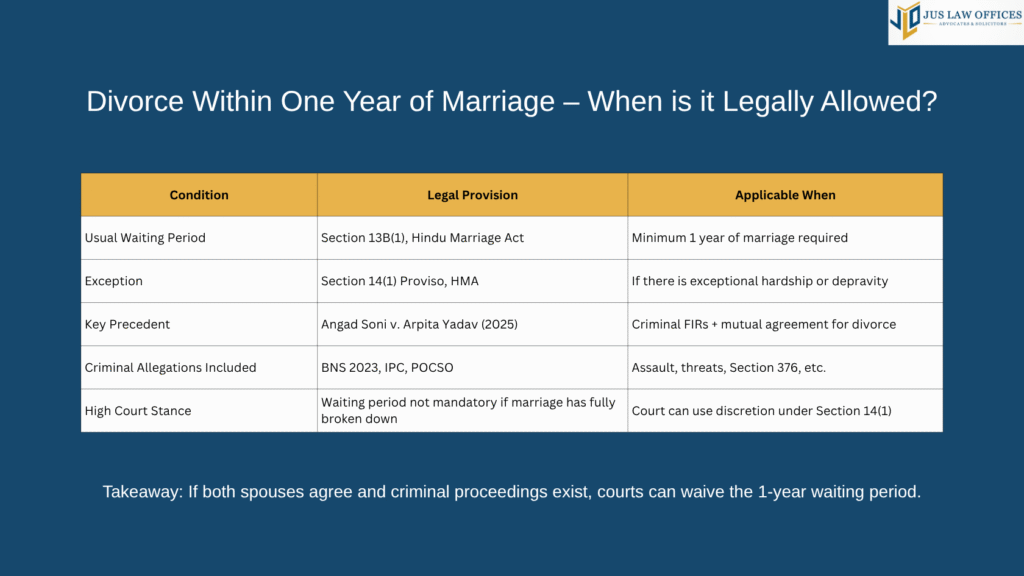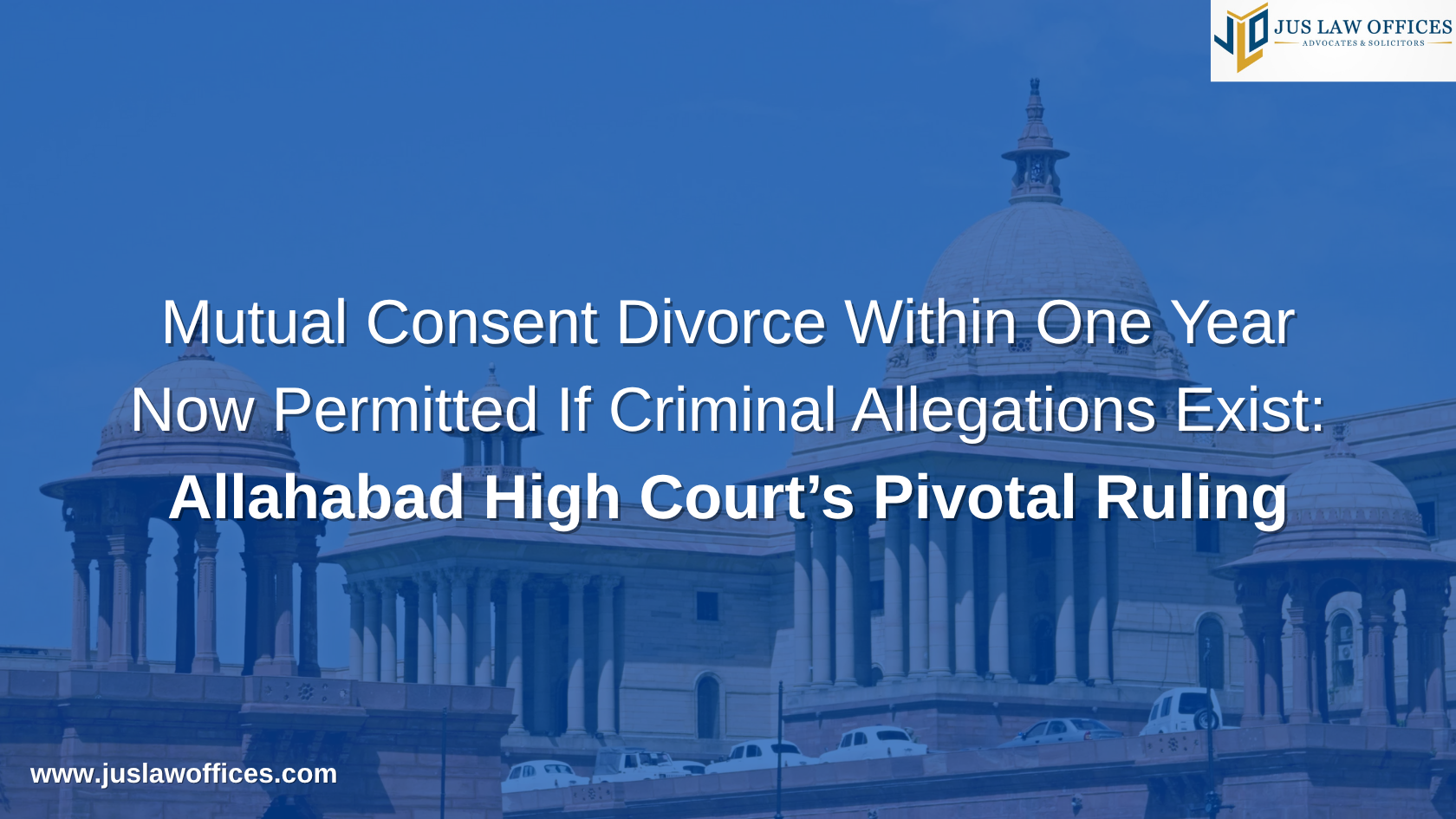Introduction
In a significant development for matrimonial jurisprudence, the Allahabad High Court has ruled that a mutual consent divorce may be granted in under one year of marriage if there are concurrent criminal allegations, once both spouses agree to separate. Justice Vivek Chaudhary and Justice Brij Raj Singh emphasized that such exceptional circumstances allow courts to apply the proviso to Section 14(1) of the Hindu Marriage Act, 1955, waiving the traditional one‑year waiting period for divorce petitions.
The Legal Framework: Sections 13B & 14(1) HMA
Section 13B – Mutual Consent Divorce
To file for mutual consent divorce, the law mandates:
- A minimum one-year marriage duration
- Joint petition by both spouses
- Two six-month separation period
Section 14(1) – Judicial Discretion
Section 14(1) grants courts the latitude to approve divorce petitions even before the one‑year term, on the ground of exceptional hardship or exceptional depravity.
Case Overview –
Angad Soni v. Arpita Yadav
(FA No. 115 of 2025)
| Detail | Information |
| Marriage Date | 5 August 2024 |
| Criminal FIRs Filed | – Under BNS 2023: Sections 115(2), 352, 351(3) – Under IPC/POCSO: Sections 376, 506, and Sections 3/4 of POCSO |
| Timeline | Criminal cases emerged shortly after marriage |
| Initial Court Decision | Family Court – Petition rejected due to failure to satisfy the one-year marriage requirement |
| High Court Decision Date | 15 June 2025 (via press release) |
High Court’s Legal Reasoning
1. Invocation of Section 14(1):
The bench emphasized that Section 14(1) operates as an exception to the one‑year condition.
“The provision to Section 14(1)… is an exception to the necessity… of one year since the date of marriage to enable a party to file a petition for divorce.”
2. Precedents from Other High Courts:
Citing recent decisions from Punjab & Haryana, Karnataka, and Kerala, the court recognized that early divorce by mutual consent is justified in broken‑down marriages.
3. Assessment of Marital Collapse:
With overlapping criminal cases and irretrievable breakdown, “there is no chance that marriage will subsist.” Hence, Section 14(1) should apply.
What the Judgment Means
- Fundamental Re-Evaluation of Waiting Period:
The one‑year mandate under Section 13B is not absolute—it yields to situations where continuing marriage causes exceptional hardship or involves exceptional depravity.
- Implication for Legal Practitioners:
Matrimonial counsel can now confidently urge courts to apply Section 14(1) in suitable cases, potentially speeding up resolution.
- Prospects for Couples in Crisis:
If your marriage has collapsed within one year and one spouse has initiated criminal proceedings, this judgment offers a viable path to mutual divorce—especially when both parties agree.

Next Steps for Affected Individuals
- Identify Exceptional Hardship/Depravity:
Examples include multiple FIRs, mental/physical cruelty, or other serious grievances. - File Joint Mutual Consent Petition:
Under Section 13B, but with supporting pleadings invoking Section 14(1). - Request Premature Relief:
Explicitly plead for waiver of the one-year requirement. - Be Prepared with Evidence:
Documentation of criminal complaints, copies of FIRs, and affidavits are essential. - Anticipate Appeal Post-Judgment:
If the Family Court rejects the petition, leverage this precedent to escalate to the High Court via appeal.
Recommended Reading from Jus Law Offices Knowledge Centre
- “Child Custody Battles in India: How the Law Prioritizes the Best Interests of the Child” – Complements divorce strategies and separation decisions.
- “Alimony and Maintenance in 2025: How Courts Are Deciding Spousal Support” – Explains financial implications post-divorce in fast-tracked cases.
7. Concluding Thoughts
The Allahabad High Court’s decision in Angad Soni v. Arpita Yadav is a meaningful shift in matrimonial law. It places humanitarian impulses at the forefront and recognizes the harsh reality of rapidly deteriorating relationships. Crucially, it reinforces the principle that legal technicalities must not entrap those in genuine distress.
If you or someone you know is facing severe marital conflict—especially within the first year of marriage—and considering a divorce, this ruling offers both hope and a legitimate path forward. While this judgment applies specifically to high courts like Allahabad, its logic may well influence other jurisdictions across India.
Disclaimer: This article is for informational purposes only and does not constitute legal advice. For tailored counsel, please consult a qualified family law practitioner.
FAQs
1. Is it possible to get a mutual divorce within one year of marriage in India?
Yes, in exceptional cases involving hardship or depravity (such as criminal allegations), courts can allow it under the proviso to Section 14(1) of the Hindu Marriage Act, 1955.
2. Does the existence of a criminal FIR automatically qualify as “exceptional hardship”?
Not automatically. The court evaluates the context — nature of the FIR, impact on the couple, and whether the marriage has irretrievably broken down.
3. Can either spouse file for divorce alone under this exception?
No. For a mutual consent divorce, both spouses must jointly agree to file. Section 14(1) only waives the one-year period, not the requirement for mutual consent.
4. Is this judgment binding across all Indian courts?
The ruling is from Allahabad High Court, so it is binding within its jurisdiction. However, it sets a persuasive precedent that other courts in India may follow.
5. What documentation is necessary when seeking an early divorce under Section 14(1)?
Couples must submit:
– FIR copies or complaint documents
– Proof of marital breakdown
– Joint petition under Section 13B
– Affidavits requesting the one-year waiver under Section 14(1)

